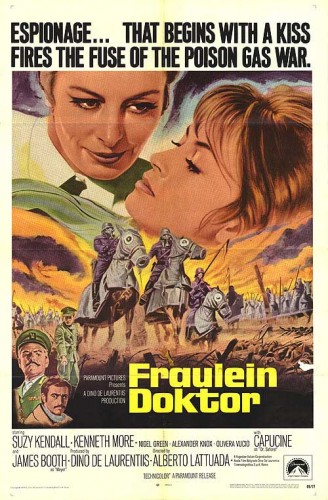
 The alternate title for this cast is: “I Feel Like I Lose When I Win” (ABBA Bizarro).
The alternate title for this cast is: “I Feel Like I Lose When I Win” (ABBA Bizarro).
Happiness is no dice for the ego, our “person” we think is us, always looking back over their shoulder. And not just at all the attacks that are coming, by definition; but especially at Death. Happiness can be no dice for the ego. (Say it isn’t so.)
Let’s “Have His Carcase” (Dorothy L. Sayers) then, and have done with it!
It happened to Elspeth Schragmueller, also known as “Fraulein Doktor”. Or at least it happened to her in the movies. It’s an excellent learning, from an amazing movie. Incidentally, that movie also had to die. It completely disappeared after it was made, and you were lucky if you ever happened to see it, by chance. Yet there it stands (or sits), containing a monumental theme of life and made fragrant by the most exquisite music. You could title Ennio Morricone’s theme for ‘Fraulein Doktor’ a requiem for the ego. That’s what I call it, and you get to hear it at the end of this cast.
Isn’t it interesting, too, that ABBA captured the Theology of the Cross so exactly: “I feel like I win when I lose”. Now all you need to do is turn that Fordeian “apophthegm” round (Round Round, Baby, Right Round) and you get: a Theology of Glory. Hence this week’s alternate title.
 John Charles Ryle, a leader of the Evangelical Party in the Church of England, lived from 1816 to 1900, and was Bishop of Liverpool beginning in l880. He is a well known figure to this day among evangelical Christians, and a man much to be admired. For 60 years he held up the Banner of Truth.
John Charles Ryle, a leader of the Evangelical Party in the Church of England, lived from 1816 to 1900, and was Bishop of Liverpool beginning in l880. He is a well known figure to this day among evangelical Christians, and a man much to be admired. For 60 years he held up the Banner of Truth.
I’ve always admired Ryle myself.
He also had some weaknesses, which carried some cost to his ministry. Once, when he was at Helmingham, a parish Mary and I have visited and which is now more famous for its garden than for its church, Ryle “shot himself in the foot”. He paid heavily for his mistake.
Later, when he was Bishop of Liverpool, he allowed a legal action to go forward against a Ritualist vicar that he could have intercepted. His ideological interests carried him away at the time, and he regretted this later.
He also opposed the construction of an Anglican cathedral for the growing “see city”, and could have handled that more nimbly.
On the plus side, J.C. Ryle was a terrific writer of plain English, and his theological tracts are as easy to read today as they were 150 years ago. He also was a ‘giant of a man with the heart of a child’. Ryle’s childlike heart was the best thing about him.
This podcast is dedicated to Fred Rogers.
Episode 108: J.C. Ryle Considered
 I never stopped to weigh the man, or least not until recently. Bishop Ryle was a sort of dead father-figure to me, like John Stott might now become for next generations of rising Christian… hero worshippers.
I never stopped to weigh the man, or least not until recently. Bishop Ryle was a sort of dead father-figure to me, like John Stott might now become for next generations of rising Christian… hero worshippers.
On the one hand, J.C. Ryle has a lot to teach concerning a Gospel that “worships God in spirit and in truth”. He was in touch with the unmediated heart of the Protestant affirmation: Nothing Between.
On the other hand, he contained some “unevangelized dark continents”, tracts of himself that were apparently un-healed. I am referring to his segment of passionate anger, anger of the man that became attached to the cause.
I honestly believe that if Bishop Ryle were able to address us today — having died (in 1900) — he would agree with this. Does any one who is “incensed for the Lord” really think his or her incensed actions will win?
Podcast 108 looks at the man’s nobility, which was real; and also at his reactivity, if I could put it that way, and the the deficit it became.
Note the Joe Meek recording at the end of the cast, which distills the good. (You can hear Meek’s voice at the start.)

COMMENTS












